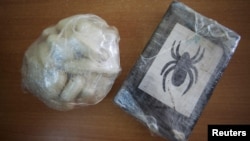Drawn by its vast coastline, weak governance and limited law enforcement capacity, drug traffickers in Latin America have turned West Africa into a major transshipment point for cocaine and other illegal drugs.
The United Nations estimates that about 10 percent of the cocaine sold in Europe and very small amounts distributed in the United States pass through Togo, Senegal and Guinea-Bissau. This is an alarming trend, both for international counter-narcotics efforts and for the stability of the nations affected because of resulting crime and corruption.
The United States has worked closely with the United Nations and other international partners to help affected countries in the region confront the threat. This month, U.S. law enforcement officers arrested five men conspiring to smuggle and store two tons of cocaine in Guinea-Bissau for later shipment to Europe and the United States. One of the detainees is the former chief of the nation’s navy, Rear Admiral Jose Americo Bubo Na Tchuto. Other officials were allegedly involved in the plot, including General Antonio Indjai, the nation’s top military leader.
Na Tchuto was arrested on a ship in international waters off the coast of Cape Verde. He and the other suspects were flown to New York, where they face charges of plotting to smuggle the drugs into the United States.
In 2010 the United States designated Na Tchuto and another prominent Bissau Guinean as drug kingpins under the Foreign Narcotics Kingpin Designation Act.
International drug trafficking remains a threat to the nations of West Africa and a source of financing for international terror networks. The United States and its international partners remain committed to breaking the link between these two threats wherever it is found.
The United Nations estimates that about 10 percent of the cocaine sold in Europe and very small amounts distributed in the United States pass through Togo, Senegal and Guinea-Bissau. This is an alarming trend, both for international counter-narcotics efforts and for the stability of the nations affected because of resulting crime and corruption.
The United States has worked closely with the United Nations and other international partners to help affected countries in the region confront the threat. This month, U.S. law enforcement officers arrested five men conspiring to smuggle and store two tons of cocaine in Guinea-Bissau for later shipment to Europe and the United States. One of the detainees is the former chief of the nation’s navy, Rear Admiral Jose Americo Bubo Na Tchuto. Other officials were allegedly involved in the plot, including General Antonio Indjai, the nation’s top military leader.
Na Tchuto was arrested on a ship in international waters off the coast of Cape Verde. He and the other suspects were flown to New York, where they face charges of plotting to smuggle the drugs into the United States.
In 2010 the United States designated Na Tchuto and another prominent Bissau Guinean as drug kingpins under the Foreign Narcotics Kingpin Designation Act.
International drug trafficking remains a threat to the nations of West Africa and a source of financing for international terror networks. The United States and its international partners remain committed to breaking the link between these two threats wherever it is found.

















